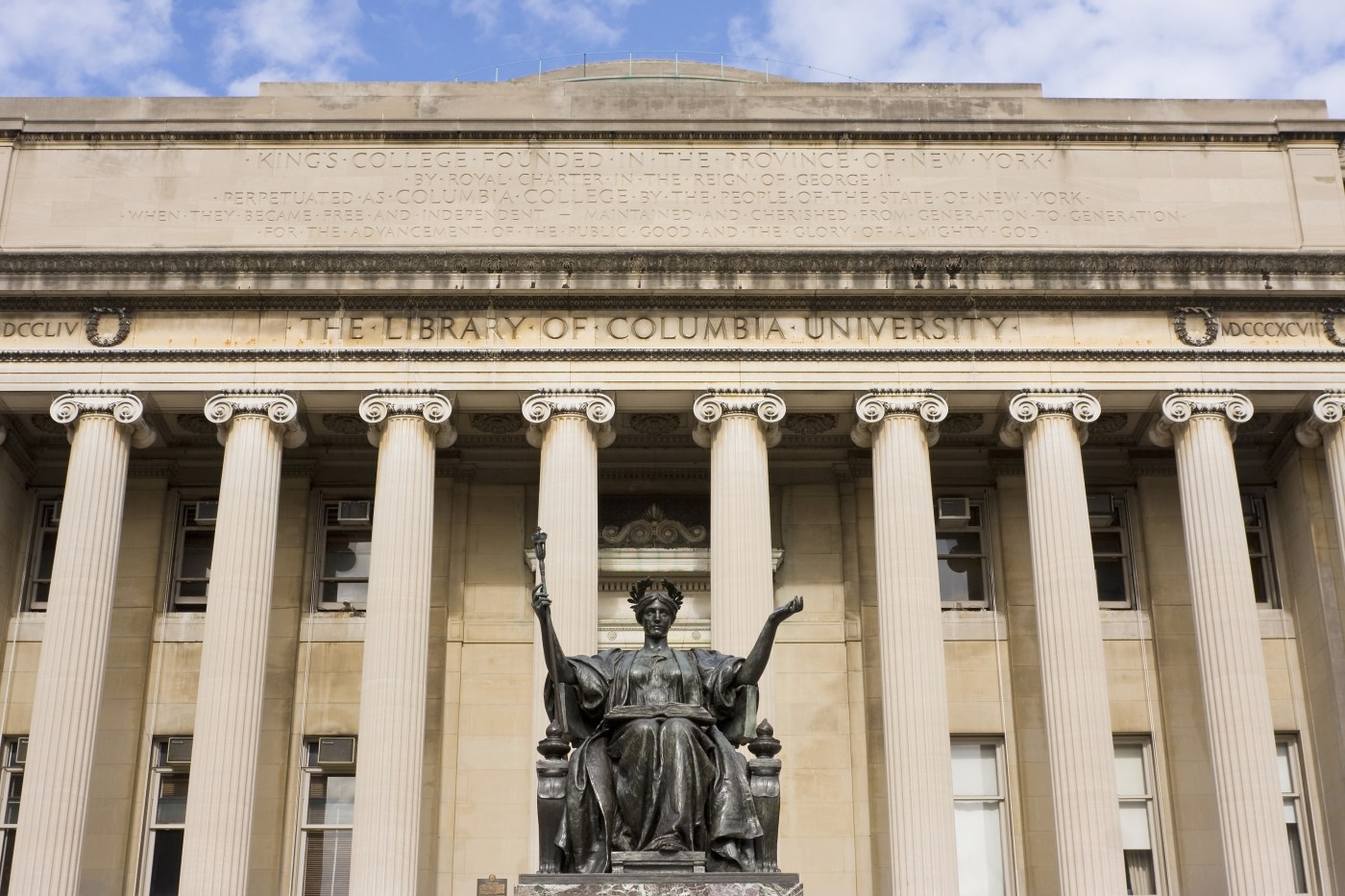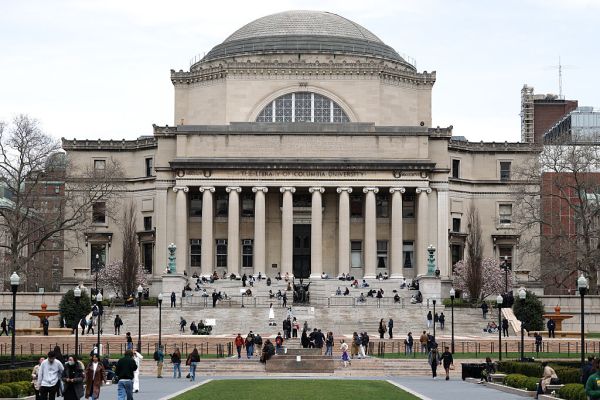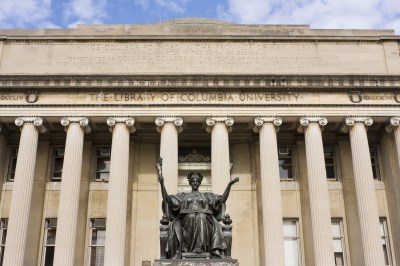It’s with mounting horror that I’ve watched President Trump escalate his assault on American universities in these past few weeks. Pulling federal funding, he’s sworn he’ll “bankrupt these universities.” As I look from my office window across the beautiful Columbia University campus, I wonder: Will American universities as we know them still exist in a few years? Or will they be replaced by Trump University, Musk University—institutions that retain the name of “university” but serve only the consolidation of power?
No one should be fooled into thinking that Trump’s crusade against the universities is a campaign to save education from the radical fringe, or ensure the safety of Jewish students, or even clean up “wokeness.” It’s a big-government coup, and only one prong of his larger project: to use threats, shock, and extortion to beat great and long-established American institutions into submission. By bringing these institutions to heel—universities, law firms, corporations, and more—he’s rapidly seizing absolute power. According to legal scholars, Trump’s attacks on higher education violate numerous constitutional provisions. But universities are nevertheless caving to his threats in a desperate attempt to save themselves from financial collapse.
Columbia, where I teach, was the first. On March 13, we were given a week to comply with the Trump administration’s many demands—abolish the University Judicial Board, give campus security the authority to arrest students, expel students who had participated in protests or were part of certain student groups, ban masks on campus, and much more—or face losing more than 10 times the $400 million in federal funds already canceled. In response, interim President Katrina Armstrong—who had replaced President Nemat Shafik after Shafik resigned in 2024 amid campus protests—published a statement that was widely viewed as total capitulation. She later told the faculty she didn’t really mean it. But she did, of course, mean to send the message to Trump: You win. A week later, under pressure from all sides, she resigned, replaced by the co-chair of the Board of Trustees, Claire Shipman, now our acting president.
Most faculty view the board with suspicion. With members drawn from business, law, and technology (rather than education), it has the job of ensuring the financial wellbeing of the university, and it is thus often seen as placing profit over principle. So it isn’t surprising that Shipman’s appointment has met with faculty resistance. But unlike Armstrong, Shipman hasn’t yielded to Trump (at least not yet). And—as a journalist who has covered the White House for at least three major networks—she has experience that may be essential to Columbia in the current crisis: Washington connections, and a public presence powerful enough to both challenge Trump’s coup and correct the gross misinformation campaign used to justify it.
To trace the sources of that misinformation campaign, and the forces that contributed to it, would require another essay. But the result is that many now view Columbia as a violent and ungovernable place, where unhinged radicals spewing antisemitic hate have taken control of the campus. Among the things that gave this view credibility is the media’s focus on the most sensational events: angry demonstrations; the occupation of Hamilton Hall; the ICE abduction of green-card holder Mahmoud Khalil. Watching the news, it’s been easy to forget that, for better or worse, only a small percentage of students participated in the protests. The other 36,000 or so were in classrooms, libraries, and labs; examining solutions to West Nile virus, exploring Aristotle’s Ethics, seeking new stars, trying to repair the world.
This is not to dismiss legitimate questions about the nature and function of the university. But the Trump administration’s attempt to exploit fears to extort the university points to a larger threat, not just to our universities but to our nation, a threat we can and must stand together to combat.
We may disagree on much. But we can, for instance, resist book purges like the one last week at the U.S. Naval Academy library, in which Trump’s defense secretary removed nearly 400 books including Janet L. Jacobs’s Memorializing the Holocaust and studies of the Ku Klux Klan. (They also removed photos of distinguished female Jewish graduates, though those were later restored.) We can stand together against the corporatization of the university, which has replaced education—the rigorous teaching of skills, the reading of great books, the exploration of ideas—with profits as the primary measure of success. We can stand together against “administrative bloat,” the displacement of faculty by (often better-paid) university administrators. And we can—and must—stand together to defend university federal funding, which is essential to the future of our country.
If you’re not sure about that last one, ask yourself: Where have advances in treatments for cancer, heart disease, diabetes, Parkinson’s, and Alzheimer’s come from? Research on AI, extreme weather, brain-computer interfaces, environmental sustainability, national security, the global AIDS epidemic, healthier aging, gun violence in schools? Federal funding to universities. This funding is essential to need-based financial aid—Pell Grants, low-cost student loans, subsidized student work-study programs—that ensure that higher education is available to all, regardless of wealth. It’s essential to initiatives like Columbia’s veterans program (which has enrolled more than 700 veterans over the past decade and a half and offers record job and graduate school placements). It’s essential to training the next generation of scientists, economists, political thinkers, essential to making good on the American promise of meritocracy, essential to producing the educated population necessary to true democracy.
While Trump says he’s targeting elite universities, the hardest hit will in fact be public universities like the University of Tennessee, Arizona State, Ohio State, or Eastern Washington University (all on his hitlist), which rely even more heavily than private universities on federal funding. Trump’s attacks present a particular threat to regional public universities like Southern Illinois University (SIU), which will lose about $4.5 million from National Institutes of Health funding cuts alone. Without federal funding, research on regional issues overlooked elsewhere—such as how to yield stronger crops, deal with invasive species in waterways, or deliver health care to rural schools—will collapse.
But these cuts will destroy far more than the universities themselves. Universities are the “economic backbone” of the (often conservative) regions they serve, writes SIU professor Molly Parker. Further cuts threaten to push not only the universities but the towns, cities, and regions that depend on them “to a breaking point.” Leaving a sea of ghost towns in rural America, such cuts would also cripple our poorest cities. In Baltimore, where one-fifth of the population lives below the poverty line, 2,000 people just lost their jobs because of federal cuts to Johns Hopkins University.
In short, this is not just a threat to the universities themselves. It is a threat to all of us. Without the innovation and educated citizens that universities generate, America can’t be great, or even merely mediocre. It will fail, like all great civilizations in which tyrants drunk on power surrounded themselves with flatterers and replaced thought with greed.
Katrina Armstrong thought negotiation and appeasement would win back our federal funds. But of course it didn’t, which is unsurprising. Appeasement only emboldens dictators. As political commentator Ben Rhodes wrote late last month, “For every … university that gives Trump a pound of flesh, he’s going to come back for more. Not just from them, from others.” Anyway, there are things too valuable to be sold, and our freedom is one of them. Purporting to educate students in democracy, we must practice what we preach. “Our colleges and universities are cradles of democracy and bulwarks against autocracy,” writes Cornell University President Michael Kotlikoff. “Only by defending democratic values and norms and educating our students to carry them forward in all their complexity and challenge will we safeguard the future of our institutions — and our nation.”
Universities and those who care about them must band together. As Harvard University professors Ryan Enos and Steve Levitsky wrote, “If Columbia or another university confronts the administration on its own, it will lose. If America’s nearly 6,000 universities and colleges launch a campaign in defense of higher education, odds are that Trump will lose.” The number of colleges and universities defying Trump is growing: Wesleyan University, Princeton University, Cornell University, Brown University, Mount Holyoke College, Delta College in Michigan, Trinity College in Washington (with others joining daily). Shipman has been quiet so far, perhaps working behind the scenes. I pray that she will soon join other university presidents in standing up to Trump. To quote Brown political scientist Melvin Rogers, “History will not judge universities by the threats they faced but by how they chose to respond. The moment is here.”






Please note that we at The Dispatch hold ourselves, our work, and our commenters to a higher standard than other places on the internet. We welcome comments that foster genuine debate or discussion—including comments critical of us or our work—but responses that include ad hominem attacks on fellow Dispatch members or are intended to stoke fear and anger may be moderated.
With your membership, you only have the ability to comment on The Morning Dispatch articles. Consider upgrading to join the conversation everywhere.